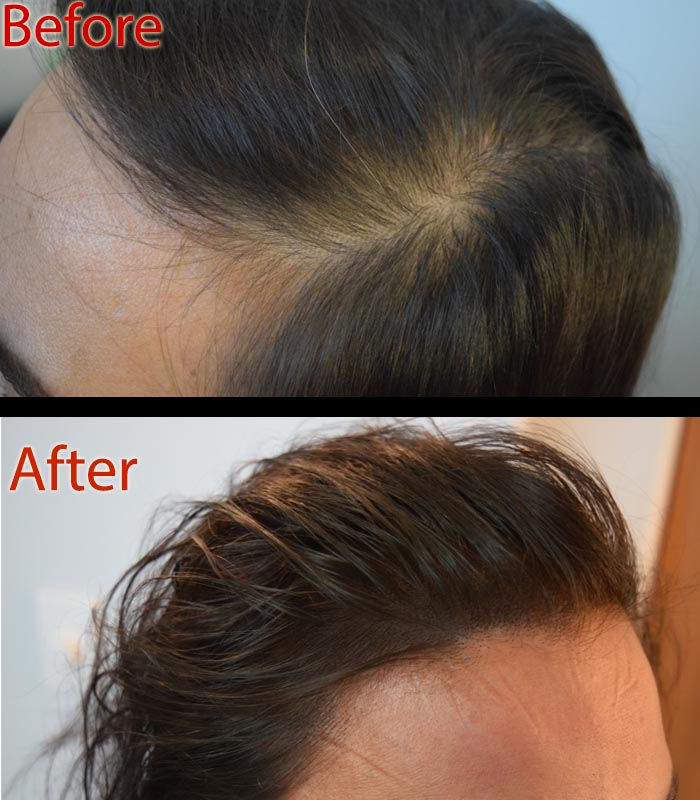PCOS-related hair thinning affects up to 70% of women diagnosed with polycystic ovary syndrome, yet many don’t realize the connection between their hormonal disorder and progressive hair loss.
Unlike male pattern baldness, PCOS hair thinning typically presents as diffuse thinning across the crown and widening parts rather than complete bald spots. When hormonal treatments and lifestyle changes fail to restore hair density, scalp micropigmentation emerges as a transformative solution.
Causes of PCOS-Related Hair Thinning
PCOS-related hair thinning in women stems from elevated androgen levels, particularly dihydrotestosterone (DHT), which disrupts the natural hair growth cycle. These excess male hormones shrink hair follicles, shorten growth phases, and eventually cause follicles to stop producing hair entirely.
Studies show that women with PCOS lose hair at rates significantly higher than the normal 100-150 strands per day, with many experiencing visible scalp show-through before recognizing the severity of their condition.
How Do You Recognize PCOS Hair Loss?
Key symptoms include gradual crown thinning, widening parts that expose more scalp, increased hair shedding during washing or brushing, and changes in hair texture that make strands finer and more brittle.
Many women notice their hair becomes harder to style and appears less voluminous, often requiring more product to achieve the previous thickness.
Can Hormonal Treatments Reverse Hair Loss?
Traditional medical approaches for PCOS-related hair thinning in women include anti-androgens like spironolactone, hormonal birth control, and insulin-sensitizing medications like metformin.
While these treatments may slow further loss, they rarely restore hair to pre-PCOS density. Clinical studies indicate that even with optimal hormonal management, hair regrowth takes 6-12 months and often remains incomplete. This is especially in areas where follicle miniaturization has progressed significantly.
Why Topical Treatments Fall Short?
Many women try minoxidil (Rogaine) to address PCOS hair thinning, but results vary dramatically. Research shows that only 30-40% of women see meaningful regrowth with minoxidil, and benefits typically plateau after 12 months.
Additionally, minoxidil requires lifelong application, and discontinuation results in rapid hair loss return. For women with advanced PCOS hair thinning, topical treatments simply cannot create the appearance of normal hair density.
Do Lifestyle Changes Help PCOS Hair Loss?
While maintaining a balanced diet, regular exercise, and stress management support overall PCOS management, these interventions have a limited impact on PCOS-related hair thinning in women once significant follicle damage has occurred. Weight loss may reduce androgen levels, but existing hair loss patterns rarely reverse completely through lifestyle modifications alone. This is where advanced cosmetic solutions become essential.
Scalp Micropigmentation for PCOS-Related Hair Loss
When medical treatments fail to address PCOS-related hair thinning in women, scalp micropigmentation offers immediate, dramatic results. SMP creates the visual appearance of hair density by depositing medical-grade pigments that mimic natural hair follicles.
Unlike treatments that attempt to regrow hair, SMP works regardless of follicle health or hormone levels. So it helps women whose PCOS has caused permanent follicle damage.
Moreover, the procedure can be customized to complement existing hair while filling in thin areas. Women with PCOS-related hair thinning typically retain some hair, making SMP an ideal density enhancement rather than complete hairline recreation.
Results are immediate, require no daily maintenance, and last 5-8 years before requiring touch-ups.
However, the procedure is effective when SMP professionals perform it. Unfortunately, many traditional tattoo artists now advertise SMP services without proper training. This is particularly dangerous for women with PCOS-related hair thinning because improper technique can create unnatural results that worsen appearance. True SMP specialists use medical-grade pigments that won’t turn blue or green over time, understand female hair loss patterns, and possess the technical expertise to create seamless density enhancement.
PCOS-related hair thinning in women doesn’t have to define your confidence or limit your styling options. While medical management of PCOS remains important for overall health, SMP provides the immediate cosmetic solution that hormonal treatments often cannot deliver. Choose your Arizona SMP specialist as carefully as you choose your doctor.
Luckily, you don’t need to travel far when it comes to choosing the best scalp micropigmentation Arizona professionals. DermiMatch Clinic is the right place to get the treatment

